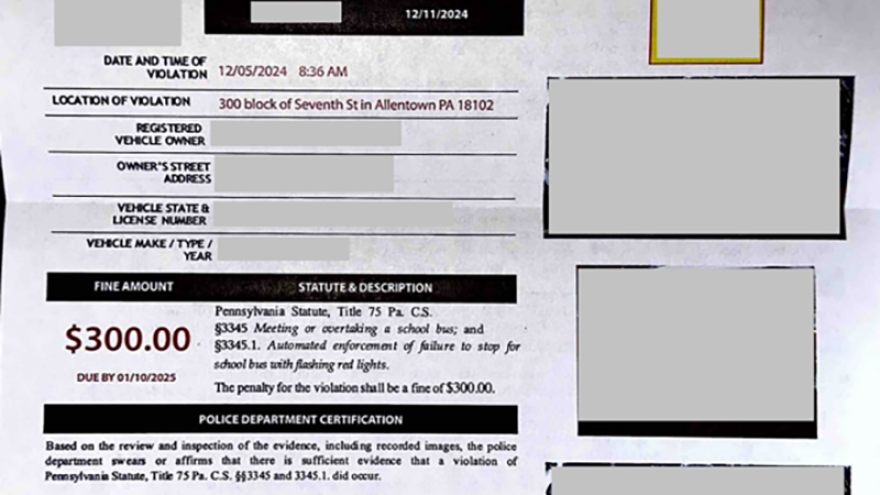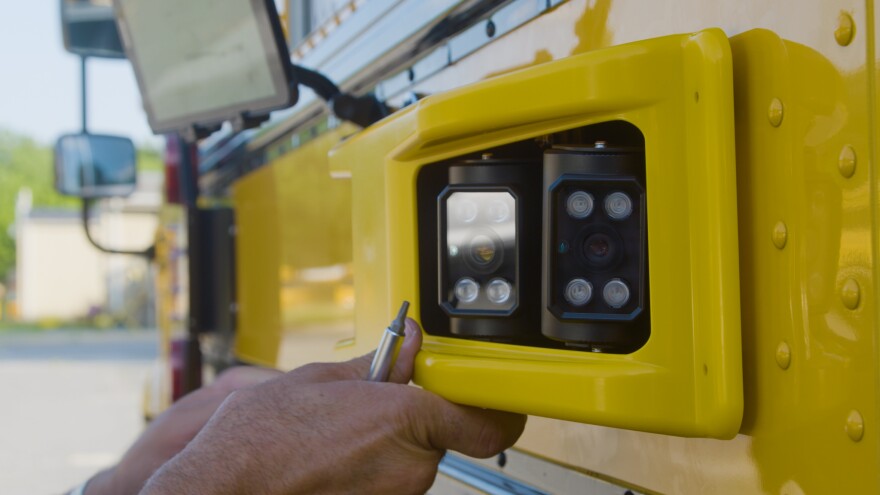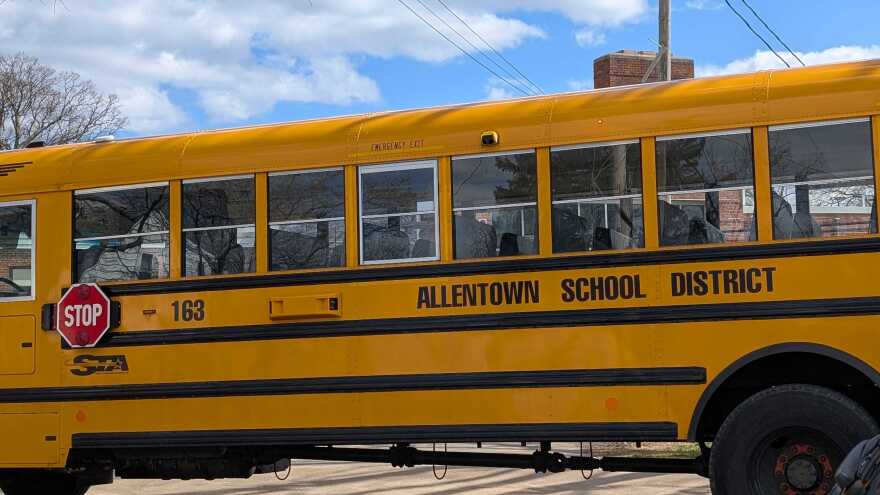BETHLEHEM, Pa. — An Allentown resident got an unexpected shock when he opened his mailbox a few months ago: a $300 fine accusing him of illegally passing a stopped school bus.
But James — who like many others did not want his last name published due to privacy concerns — insists he did nothing wrong. He says the weather and timing made it nearly impossible to stop safely.
“My argument I’m hoping to make to PennDOT — I was not provided enough time to safely stop, as the red lights and stop sign started as I was about a car length behind passing in the middle lane (in the 300 block of 7th St.),” he wrote in an email.
It was snowing that day — December 5, 2024 —and James says the slick roads would have caused him to stop alongside or just past the bus, not behind it.
His claim checks out: the National Weather Service confirmed light snowfall that day. His citation is real, too.
But James’s situation isn’t unique.
Across the Lehigh Valley, a growing number of drivers say they’ve been caught up in a flawed system that offers little in the way of due process when it comes to automated school bus enforcement.
An analysis by LehighValleyNews.com found that of the more than 1,000 motorist appeals of school bus stop citations issued in the Lehigh Valley since January, not a single hearing for those 2025 appeals has been held.
That's because of a backlog of cases from 2024 and the overwhelming number of appeals the state's eight hearing officers have on their dockets, according to PennDOT.
A 2023 amendment to state law changed the process for contesting violations, taking them out of local district courts and establishing a system for appeals through a PennDOT hearing officer.
Automated fines, limited recourse
The citations are issued by BusPatrol, a private company that equips school buses with automated cameras. When a violation is flagged, drivers face hundreds of dollars in fines and have just 30 days to appeal from the time they receive the violation notice.
But many drivers say the appeals process is nearly impossible to navigate.
“If a payment is not received or the owner has not contested liability within 90 days of the mailing of this violation, the amount owed may be turned over to a collection agency,” the citation warns.
James, however, says he hasn’t even been given a chance to formally contest it.
“I have not received any phone calls, emails or mail from any party regarding this since my phone call (to BusPatrol) in late December,” James said.
“I have not received any phone calls, emails or mail from any party regarding this since my phone call (to BusPatrol) in late December."James, an Allentown resident who received a citation
Like many others, James wants the basic rights typically provided in traffic court: the presumption of innocence and the ability to review clear, complete evidence.
But these citations aren’t criminal violations — they’re civil matters handled outside the court system. That means filing an appeal through the mail or an online portal, with a hearing scheduled in front of a PennDOT hearing officer.
Even then, drivers say, it’s been nearly impossible to get a response to their appeal request — let alone a resolution.

Thousands of cases in limbo
On April 25, LehighValleyNews.com asked PennDOT how many of these violations had gone before a hearing officer this year. After several days, Deputy Communications Director Jennifer Kuntch responded with data showing nearly 500 citations across four local school districts were awaiting hearings —just in 2025 alone.
Pending cases included:
- 298 in the Allentown School District
- 74 in Bethlehem
- 92 in Easton
- 11 in Salisbury Township
LehighValleyNews.com also asked for hearing schedules, the number of hearing officers and whether proceedings could be observed.
On May 15, Kuntch said the total number of violations pending hearing across seven Lehigh Valley school districts was 1,013 — adding Catasauqua, Northwestern Lehigh and Wilson Area School District hearings to the tally.
"The time frame in which someone contesting a violation receives acknowledgement from the school district or the system administrator is governed by those entities. Most hearings are conducted virtually," she said.
Since launching hearings in May 2024, PennDOT hearing officers have faced a significant backlog of cases, Kuntch said. When hearings began, the officers inherited roughly 2,300 pending violations dating back to December 2023.
Since then, the number of schools enrolled in the Pennsylvania enforcement program has doubled, leading to a sharp rise in contested citations. PennDOT now receives between 1,200 and 1,500 hearing requests each month, Kuntch said.
The volume is further complicated by drivers missing or rescheduling hearings, which adds to the backlog of unresolved cases.
Currently, eight full-time hearing officers are responsible statewide for managing hearings for both the Automated School Bus Enforcement and the Work Zone Speed Safety Camera programs, Kuntch said.
Each contested school bus violation takes approximately 25 minutes to process, including 15 minutes for the hearing itself, plus time for pre-hearing review and post-hearing documentation.
Despite the growing caseload, PennDOT officials emphasize that hearing officers are committed to ensuring every motorist eventually has a fair opportunity to present their case.
The full tally of violations pending hearing as of May 15, 2025, was:
| School District | Total # of Violations Pending Hearing |
| Allentown School District | 402 |
| Bethlehem Area School District | 219 |
| Catasauqua Area School District | 82 |
| Northwestern Lehigh School District | 7 |
| Salisbury Township School District | 18 |
| Wilson Area School District | 17 |
| Easton Area School District | 268 |
‘We’re not trying to break the law’
As LehighValleyNews.com awaited PennDOT data, residents continued to share stories and evidence tied to their citations. In some videos, the stop sign on the bus only begins to extend as cars are already passing.
One video was slightly blurry, in black and white, and lacking sound, making it hard to determine whether the bus's flashing warning lights were on before the stop sign deployed.
Many drivers fully agree with the law’s intent: keeping children safe. But they say the camera system doesn’t capture the full context.
Paul, an Easton resident, paid a citation he received last June — before realizing how many others were in the same boat.
“We would never knowingly run a bus light and put a child in danger."An Easton resident whose husband received a citation
“We would never knowingly run a bus light and put a child in danger,” Paul’s wife said, explaining that her husband was not able to see the bus lights activated from his vantage point.
“Even if he could and slammed his brakes on, the car following him would have plowed into him,” she said.
They didn’t want their last name used, but said even some school employees are dealing with similar tickets.
One of them, a teacher who also volunteers as a crossing guard, said the idea that she would endanger children and pass a stopped school bus is “absolutely absurd.”
Each citation for these incidents includes a demand for immediate payment and a warning that failure to respond can lead to extra penalties. And residents say that with their cases stuck in limbo, they feel they’re presumed guilty until proven innocent.

Trouble on Route 248
Another Easton resident, Nora, said she’s received two citations along Route 248 — a known hotspot for violations.
At a school board meeting in February, Easton Area School District officials said six of the top 10 violation locations were on that road.
Because Route 248 isn’t a true divided highway with a physical barrier, drivers in both directions are required to stop when a bus is picking up or dropping off children. But many say that rule isn’t always clear — or safe.
“It seems like a scam, if they’re racking up all these tickets,” Nora said. “Sometimes, you cannot tell where the bus is stopping.”
She said she’s changed her entire morning commute to avoid Route 248 after being cited. “By the time you stop, you’re going to cause a really bad accident.”
At that February meeting, officials reported nearly 2,000 violations had been flagged in Easton, Forks and Palmer. About 400 were disapproved due to factors like obstructed views or unsafe conditions for stopping.
Still, Easton school safety supervisor John Remaley said at the school board meeting many violations stem from “driver ignorance” — people not knowing the rules.
But Nora and others push back.
They’re not ignorant, they say. The system just doesn’t account for reality.
Areas of high incidence
Amanda, another Easton resident, said her husband was cited while driving in the far-right lane of Route 248 — just as the bus was extending its stop sign all the way on the other side of the road.
“He was already at the point of no return,” she said. “I submitted an appeal, but we have yet to hear back.”
Josh Ziatyk, assistant superintendent for district operations and services at Easton Area School District, told LehighValleyNews.com last week that he was unaware drivers weren’t getting timely hearings.
“It’s the first time I’m hearing it,” he said. “I have not heard that until today.”
Ziatyk said the district will continue to look at “areas of high incidence” such as Route 248, to see what, if anything, can change.
“We have that responsibility to look at best options (for bus stops). That’s something we have done and will continue to do,” he said.
In the particular case of Route 248, Ziatyk said it’s difficult for the district to educate drivers so they’re aware of all the rules of the road.
“If we’re aware of specific concerns, we want to assist in any way we can,” he said, noting the district engages in continued analysis of data to determine changes to stops or rerouting of buses.
“BusPatrol was put in place for student safety. We can’t turn a blind eye to student safety."Dr. Josh Ziatyk, Easton Area School District
But Ziatyk said that separate from the appeals system failing to operate expeditiously, Easton and other districts need to continue to put student safety at the forefront.
“BusPatrol was put in place for student safety," he said. "We can’t turn a blind eye to student safety. And so it doesn’t necessarily mean (with so many hearings delayed) we shouldn’t continue with protecting students.”
“With regard to the hearings, that’s certainly a question for PennDOT,” he said.
‘Set it up so it’s fair’
In response to questions about the perceived lack of due process in place, one local attorney said it raises a number of questions.
“When you take something like this and create a new offense, but then create a system to address that offense, you’ve got an obligation to set it up so that it’s fair,” said Philip D. Lauer, partner at Gross McGinley Attorneys At Law in Allentown.
“How about the people that are charged with an offense? There’s nothing here that’s a benefit to them in terms of how any of this is being handled.
“In my view it’s very, very similar to a traffic citation and therefore it’s not just a civil proceeding,” he said.
“Quite frankly, the whole process strikes me as violating a number of rules that I think should be looked at more carefully.”
Lauer faults state lawmakers for putting a law into effect and then changing how it will be governed. Initially, violations were heard by local magistrates. But changes to the law meant PennDOT hearing officers were supposed to take over the cases.
“We have a legislature putting into effect a law which says number one you can’t do this, number two we can charge you even if we don’t know you were driving the vehicle. We have the ability to charge you and then you have to prove it wasn’t you.
“Number three, they claim it to be a civil proceeding, not criminal, but at the end of the day when it’s over they can fine you.
“It seems to me the simple definition of what is actually a traffic proceeding should be governed by the same rules in order to arrive at a disposition,” Lauer said.
Most troubling to Lauer is the open-endedness of one provision of the state law.
"No one should be waiting six months or more just to get a hearing.”Attorney Philip D. Lauer, partner at Gross McGinley Attorneys at Law
“With regard to almost every step there are very significant time limits,” he said. “They have 30 days to send the notice, and there are all these other tiny little periods of time (accounted for in the statute),” he said.
But one section reads: Upon receipt of a hearing request, the school entity, or the system administrator on the school entity's behalf, shall in a timely manner schedule the matter before a hearing officer designated by the department.
Lauer says use of the phrase “in a timely manner” needs serious attention and oversight.
“More to the point, nor is there anyone who says, 'No, this hasn’t been timely.' No one should be waiting six months or more just to get a hearing.”
And one local lawmaker emphatically agreed.
‘That’s crazy’
State Rep. Josh Siegel, D-Lehigh, said he believes there is broad consensus among lawmakers and the general public in protecting kids from careless and erratic drivers.
“But for the folks who are, in good faith, trying to figure out what they can do to rectify (these citations) — that’s one of our basic judicial processes is you get your day in court. That people are waiting this long … that’s crazy.
“My biggest thing is this boils down to making sure that we go to PennDOT and put some sort of deadline in place and we’re standing up the procedural process so these citations can be adjudicated.
“If the stated goal should be to keep kids safe, folks need their day in court as quickly and expeditiously as possible,” he said.
Siegel, a member of the House Transportation Committee, said he believes it makes sense to put the hearings back in front of magisterial district judges.
“If the stated goal should be to keep kids safe, folks need their day in court as quickly and expeditiously as possible."State Rep. Josh Siegel
“I think it makes sense to keep it in the MDJ system. We elect our MDJs so those judges are accountable to the people and are responsible for adjudicating all other traffic-related matters.
“For the sake of efficiency and local control it would make sense for these to be run through the local judicial system,” he said.
Siegel believes the law was written with good intent but says it’s imperfect in many respects. The bill, authored by then-state senator Pat Browne, R-Lehigh, and state Rep. Mike Schlossberg, D-Lehigh, was signed into law by former Gov. Tom Wolf in 2018.
Lawmakers amended it in 2023 in part to transfer the onus of citation challenges from district court to PennDOT.
“We should go back and update it to make sure it’s serving the public interest,” Siegel said. “We could probably do it in a few months if we were moving expeditiously.”
He said further changes to the law also should include a provision around transparency. The comments came weeks after LehighValleyNews.com initially had a Right to Know request denied seeking more than a dozen data points on citations in Allentown.
Allentown Open Records Officer Bridget Winter supplied some data Thursday, but LehighValleyNews.com's appeal of the denial remains, pending a determination from the state Office of Open Records.
In the first three months of this year, more than 3,100 citations for school bus stop arm violations had been issued in Allentown.
“Any time we’re collecting fines and fees from the general public, it needs to be transparent,” Siegel said. “This is not an appropriate way to finance an organization, with these fines and fees, when a school district is getting revenue, police departments are getting revenue.
“I think we need to go back to the legislation and create some mandatory transparency provisions,” he said.
“It’s not a hard ask to have every school district with these cameras upload things like the total citations, total citations contested and revenue raised in a place people can find it. The public is owed that.
“But these citations — what good is a punishment or citation if there’s no process?” he asked.
“Due process is literally a fundamental right guaranteed by the U.S. Constitution.”

BusPatrol responds
In response to questions about the BusPatrol program, Ryan Monell, senior vice president of government operations, said any program with any integrity “has to have due process baked into it.”
Monell said one of the things BusPatrol has tried to ensure “from the beginning to the end” is integrity, including clear communication to citizens across the commonwealth.
“If there’s an issue we’ll be transparent about that."Ryan Monell, Senior Vice President, Government Operations at BusPatrol
“If there’s an issue we’ll be transparent about that,” Monell said. “The challenge — and I’m sure there’s an argument to be made — that there’s more that can be happening faster in terms of these hearings.
“The thing to remember is if someone has contested a citation and we’ve said we received that notice, they should remember they’re not going to be held liable until there's a hearing. So the process in place, that’s what’s happening.
“This is being run through a state agency and there’s a lot of responsibilities for PennDOT and there’s a lot the commonwealth depends on PennDOT for.
“Resources are always finite and there’s an aspect of the funding from the violations that contribute to support hearing officers and all of that. There’s only so much they can administer week over week."
He said once a hearing is scheduled for these citations, drivers receive ample warning.
"They’ll receive another notice saying this is when your hearing has been scheduled and this is how you join the hearing. That should be 30 days prior to the hearing being scheduled," he said.
But Monell also acknowledged the frustration of drivers who haven’t had their proverbial day in court.
“For the specificity for folks who feel they’ve been left in the dark, that’s unacceptable and we’ll look into it," he said.
“The process in Pennsylvania is a good process, but I totally understand the concern.”


